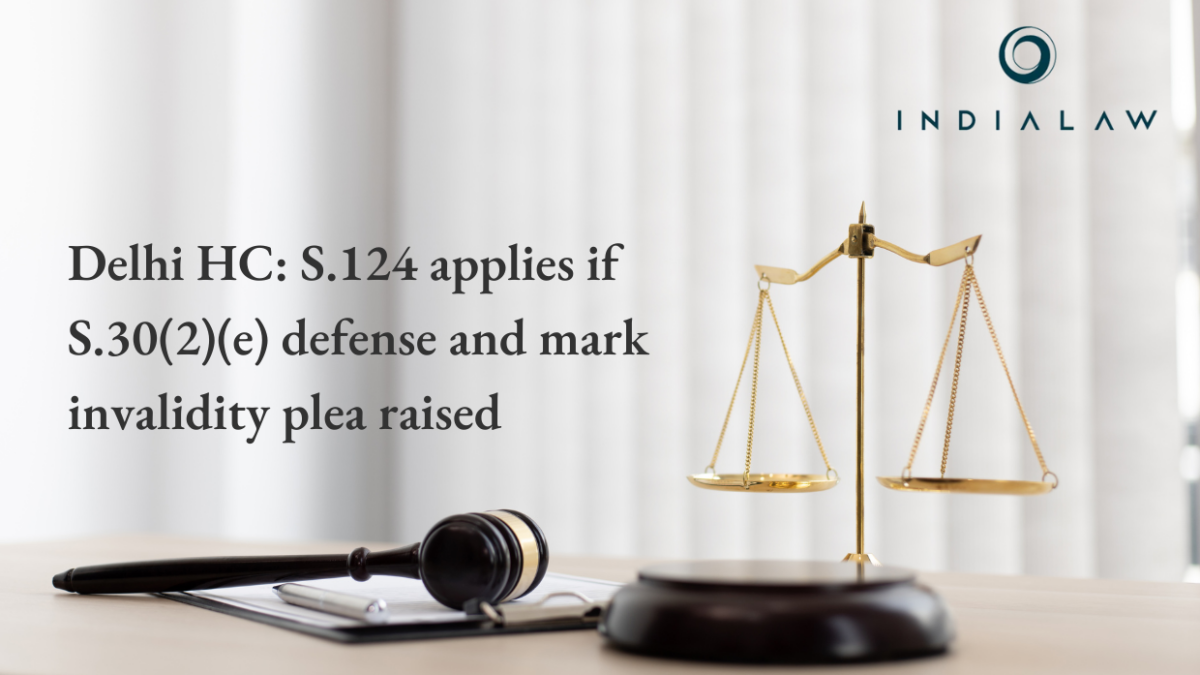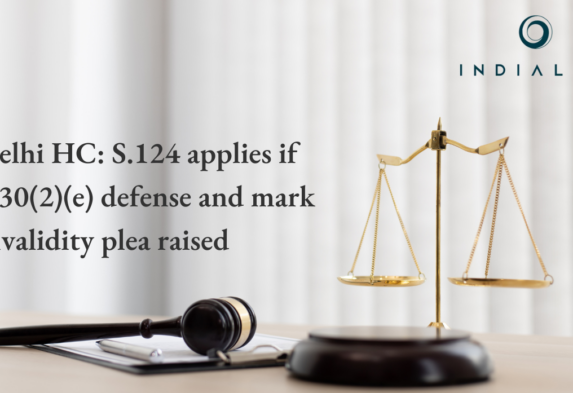Section 124 of the Trade Marks Act, 1999 will be applicable only when a defence is raised under Section 30(2)(e) of the Act, followed by a plea of the invalidity of mark: Delhi High Court


The Hon’ble High Court of Delhi[1] (“HC”) recently dismissed an application moved by International Great Brands LLC, under section 124 of the Trade Marks Act, 1999 (“TM Act”) against Parle’s ‘FABIO’ mark.The HC dismissed the same by holding that in a suit for trademark infringement, an application under section 124[2] of the TM Act requires two pre-conditions: the raising of a section 30 (2) (e)[3]defence by the Defendant and a prima facie tenable plea of invalidity raised by the Plaintiff.
The HC was hearing a plaint filed by International Great Brands LLC, (“Plaintiff”) which is a proprietor of the registered device marks, and word marks ‘OREO’ and ‘OREO O’S’, that sell vanilla filled chocolate cream cracker biscuits. The plaint was filed againstParle Products Pvt. Ltd. (“Defendant”)that sells cookies/biscuits under the trade dress ‘FAB!O’. It was alleged by the Plaintiff that the trademarkFAB!O wasvirtually identical and deceptively similar to their trademark i.e., OREO. The plaint was, thus, filed to seek a permanent injunction against the Defendant. Thereafter, once the suit had proceeded and passed the stage of replication, the Plaintiff filedan application under section 124 of the TM Act.
For the reader’s convenience, section 124 prescribes a court hearing a suit for trademark infringement to do one of two things; either to stay the suit in case a rectificationproceeding is pending before the Registrar of the respective High Court till its finality, or to frame an issue as to the validity of the mark alleged to be invalid and stay the suit for a period of three months to enable the concerned party to apply to the respective High Court for rectification of the register.
The HC placed reliance on its earlier decision in Dharampal Satyapal Ltd. v. Basant Kumar Makhija[4],and opined that for applicability of section 124(1) of the TM Act, the Defendant must mandatorily raise adefence undersection 30(2)(e) of the TM Act by citing the registration of its mark as a defence to infringement and, if this is done, the Plaintiff must plead invalidity of the defendant’s mark.
The HC also clarified that the aforesaid would happen in the following manner. A plaint is filed, as in the instant case, alleging infringement of the Plaintiff’s registered mark. In its written statement, the Defendant ought to raise a defence under section 30 (2) (e) of the TM Act claiming impunity by virtue of registration of its own mark. Thereafter, the Plaintiff must make a plea of invalidity of the Defendant’s mark. This can happen in two ways. Either the Plaintiff prefers an application for amendment of its plaint, as observed in the case of Travellers Exchange Corporation Ltd. v. Celebrities Management Pvt. Ltd.[5], or the Plaintiff may raise such a plea in its replication.
The HC further went on to state that when a plea of invalidity is raised by the Plaintiff, the same is required to include grounds which are prima facie tenable in the eyes of the court hearing the application under section 124. Therefore, the court is required to be satisfied that a defence has been raised under section 30 (2) (e) and, if the same is done, the Plaintiff has raised prima facie tenable grounds challenging the validity of the mark claimed by the Defendant.
In the instant case, however, the HC observed that the Plaintiff had,unfortunately for it, failed to raise a plea of invalidity either in its plaint or in its replication. Consequently, the application under section 124 would have to fail due to this reason. It was sought to be contended that the plea of invalidity may be raised in an application under section 124. However, the HC dismissed this contention by observing that the ambit of section 124 prescribes for the plea having already been taken and not for the plea being made under a fresh application. Further, it was also observed that a specific and express plea of invalidity making out prima facie tenable grounds are mandatory, and the same cannot be read into by interpretation of the plaint and / or the replication. Hence, the application was dismissed.
This judgment has lucidly laid down the two mandatory prerequisites for section 124 of the TM Act to apply, as detailed hereinabove. It also makes it clear as to the manner that a Plaintiff is required to raise a plea of invalidity. Finally, it is also made clear that a court is bound by section 124 a scenario where the conditions are satisfied. In such a scenario, either the court must stay the suit till the rectification proceedings do not reach finality or frame an issue as to validity and then stay the suit,for a duration of three months from such framing of issue, to permit the concerned party to apply to the respective High Court for rectification of the register.
[1]Intercontinental Great Brands LLC v. Parle Product Private Limited [2023 LiveLaw (Del) 1069]. The bench constituted of C. Hari Shankar, J.
[2] The relevant portion of section 124 of the Trade Marks Act, 1999 states as follows:
“124. Stay of proceedings where the validity of registration of the trade mark is questioned, etc.
(1) Where in any suit for infringement of a trade mark-
(a) the defendant pleads that registration of the plaintiff’s trade mark is invalid ; or
(b) the defendant raises a defence under clause (e) of sub-section (2) of section 30 and the plaintiff pleads the invalidity of registration of the defendant’s trade mark, the court trying the suit (hereinafter referred to as the court), shall,-
(i) if any proceedings for rectification of the register in relation to the plaintiff’s or defendant’s trade mark are pending before the Registrar or the Appellate Board, stay the suit pending the final disposal of such proceedings;
(ii) if no such proceedings are pending and the court is satisfied that the plea regarding the invalidity of the registration of the plaintiffs or defendant’s trade mark is prima facie tenable, raise an issue regarding the same and adjourn the case for a period of three months from the date of the framing of the issue in order to enable the party concerned to apply to the Appellate Board for rectification of the register.…”
[3]Section 30 (2) (e) of the Trade Marks Act, 1999 states as follows:
“30. Limits on effect of registered trade mark
(2 ) A registered trade mark is not infringed where-
(e) the use of a registered trade mark, being one of two or more trade marks registered under this Act which are identical or nearly resemble each other, in exercise of the right to the use of that trade mark given by registration under this Act.”
[4] 2023 SCC OnLine Del 6598.
[5] 298 (2023) DLT 101.




